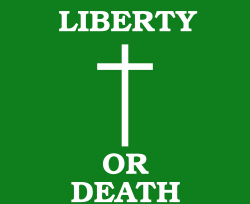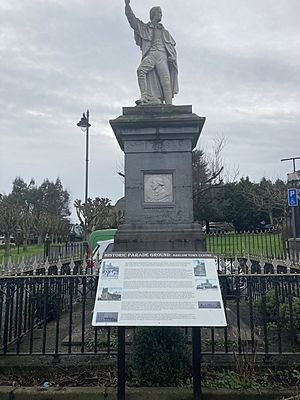Battle of Arklow facts for kids
Quick facts for kids Battle of Arklow (1798) |
|||||||
|---|---|---|---|---|---|---|---|
| Part of the United Irishmen Rebellion | |||||||
 One of the flags carried by the rebels. |
|||||||
|
|||||||
| Belligerents | |||||||
| Commanders and leaders | |||||||
| Francis Needham | Billy Byrne Anthony Perry Edward Fitzgerald Michael Murphy ☠ |
||||||
| Strength | |||||||
| 1,700 | 10,000 | ||||||
| Casualties and losses | |||||||
| c.100 dead | c.500 dead | ||||||
The Battle of Arklow was an important fight during the Irish Rebellion of 1798. It happened on June 9, 1798. A large group of Irish rebels, about 10,000 strong, attacked the town of Arklow in County Wicklow. The town was held by British forces. The rebels wanted to spread their fight for independence into Wicklow and get closer to Dublin, the capital city.
Contents
Why the Battle Happened
Before the Battle of Arklow, the rebels had a big win at a place called Tuberneering on June 4. This victory helped them break through the British army's attempts to surround County Wexford. They also captured three cannons. After this, the town of Arklow was left empty for a short time. However, the rebels stayed in Wexford.
On June 5, the rebels tried to move out of Wexford and spread the rebellion. But they were stopped by a major British victory at the Battle of New Ross. When the rebels finally decided to attack Arklow, the British had already returned. About 1,700 soldiers from Dublin, led by Francis Needham, had taken over the town. They quickly built defenses and placed cannons at all the main entry points.
The Fight at Arklow
The rebel army that attacked Arklow on June 9 was made up of fighters from both Wexford and Wicklow. Their leaders included Billy Byrne, Anthony Perry, Edward Fitzgerald, and a priest named Fr. Michael Murphy.
The British forces in Arklow had about 1,000 local soldiers from Antrim and Cavan. They also had 150 cavalry (soldiers on horseback) and 250 Yeomanry (volunteer soldiers). Just an hour before the rebels arrived, 315 more soldiers, called Durham Fencibles, joined them. This brought the total British strength to about 1,700 men.
How the Battle Started
The area around Arklow was covered in thick bushes and scrubland. The rebels planned to use this cover to sneak up and attack the town from several different directions at the same time. Before the main attack, the rebels used some of the cannons they had captured earlier. They managed to hit a British cannon position directly, destroying the cannon and killing its crew.
The Main Attack
The rebels then launched their main assault. However, at every entry point, they were pushed back. The British soldiers were well-trained and disciplined. They fired their muskets and used canister shot from their small cannons. Canister shot is like a giant shotgun blast, very effective against groups of soldiers.
The British tried to chase the retreating rebels. But the rebels, especially their pikemen (soldiers with long spears) and sharpshooters, fought back. They forced the British cavalry to retreat back across the River Avoca. The rebels then tried to force their way into the town through a fishing port, but this attack was also stopped with heavy losses.
Rebel Retreat
As the battle continued, the rebels started to run out of ammunition. They also lacked clear leadership. When Fr. Michael Murphy was killed while leading a charge, their attacks began to weaken. As night fell, the rebels started to pull back under the cover of darkness. They collected their wounded soldiers. The British soldiers did not chase them. What the rebels didn't know was that the British were also almost out of ammunition, with only a few rounds left per soldier.
What Happened After
The Battle of Arklow was a British victory. The rebels lost about 500 fighters. The British had fewer casualties, probably around 100 dead and wounded.
This defeat at Arklow was a major setback for the rebels. It was their third failure to expand the rebellion beyond County Wexford. They had also been stopped at New Ross and Bunclody. After Arklow, the rebels changed their plan. Instead of attacking, they decided to focus on defending the areas they already controlled against the advancing British forces.
See also
 | George Robert Carruthers |
 | Patricia Bath |
 | Jan Ernst Matzeliger |
 | Alexander Miles |


